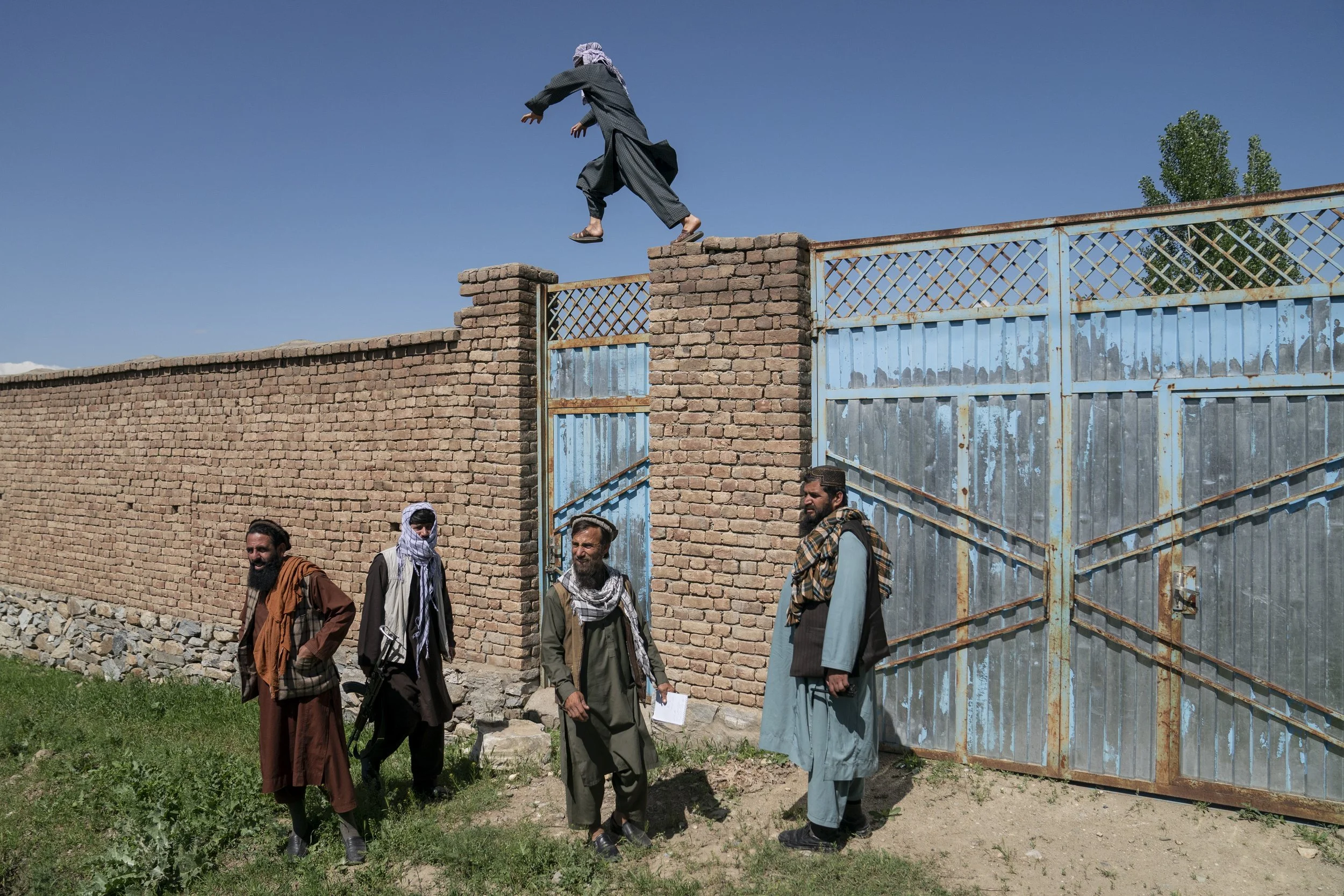
Opium: Climate Change Threatens Taliban's Ban
PARWAN, AFGHANISTAN-MAY 18:A Taliban police officer leaps across a gate to gain entry to and destroy a poppy field in Parwan province, Afghanistan on May 18, 2024. For decades, Afghanistan was the top exporter of opium in the world, accounting for more than 80 percent of the global supply prior to last year. Two-thirds of the country’s opium poppies were grown in southern Afghanistan, where temperatures in the last fifty years increased by up to 4.3 degrees Fahrenheit. The hardy plants thrived despite the harsh, salty desert landscape. Farmers relied on the crop to make their living through droughts and heat. Two years ago, after the Taliban took power in Afghanistan, they banned opium on religious grounds. Afghan farmers turning to alternative crops are finding that many no longer grow well because of the impact of climate change. This is forcing some farmers to abandon their fields, while others are weighing whether they should continue to comply with the ban on poppy cultivation. (Photo by Carolyn Van Houten/The Washington Post)
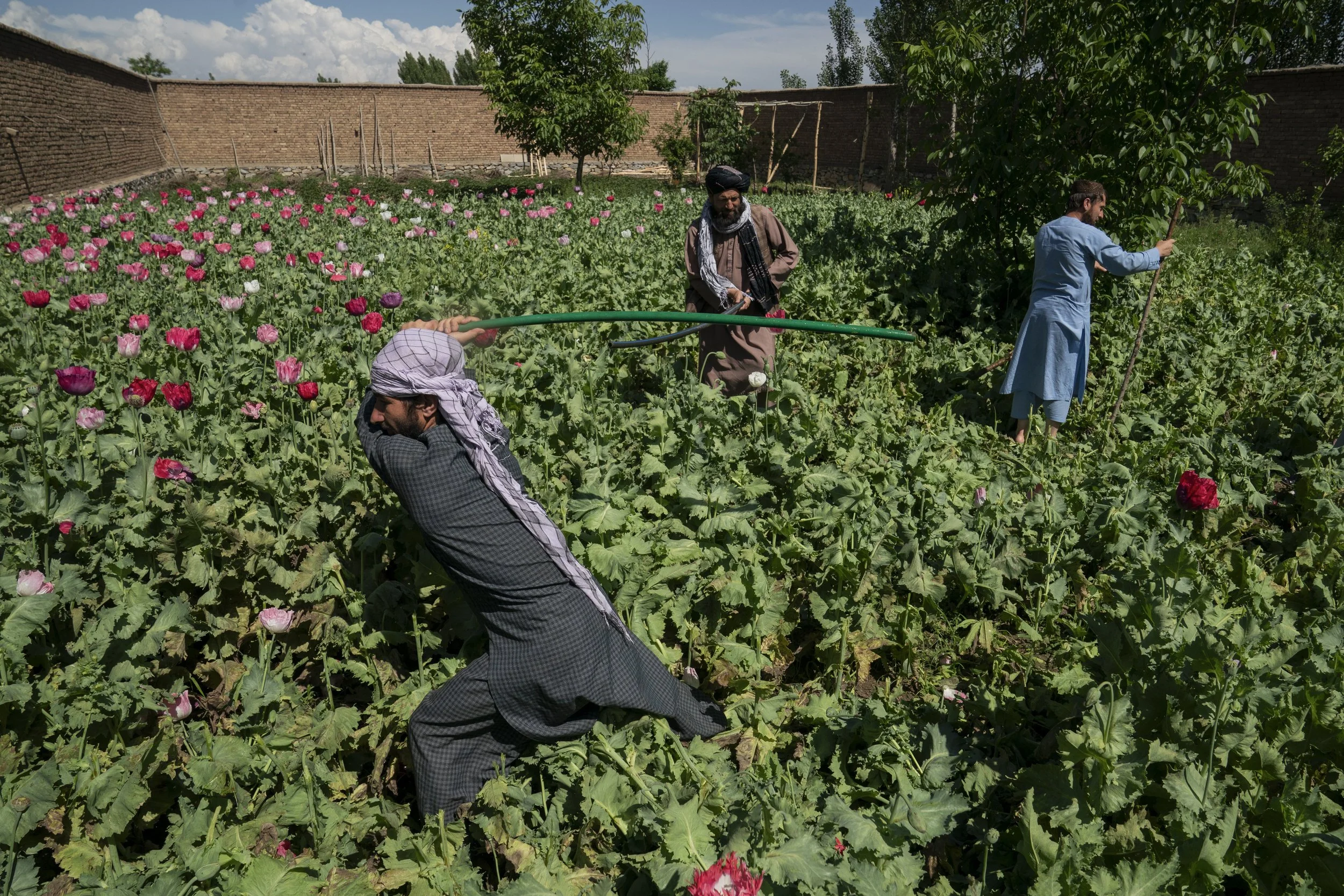
Opium: Climate Change Threatens Taliban's Ban
PARWAN, AFGHANISTAN-MAY 18:A group of Taliban police officers destroy a poppy field in Parwan province, Afghanistan on May 18, 2024. Breaking the stalks with sticks releases a milky liquid from the plants and renders them useless in producing opium.For decades, Afghanistan was the top exporter of opium in the world, accounting for more than 80 percent of the global supply prior to last year. Two-thirds of the country’s opium poppies were grown in southern Afghanistan, where temperatures in the last fifty years increased by up to 4.3 degrees Fahrenheit. The hardy plants thrived despite the harsh, salty desert landscape. Farmers relied on the crop to make their living through droughts and heat. Two years ago, after the Taliban took power in Afghanistan, they banned opium on religious grounds. Afghan farmers turning to alternative crops are finding that many no longer grow well because of the impact of climate change. This is forcing some farmers to abandon their fields, while others are weighing whether they should continue to comply with the ban on poppy cultivation. (Photo by Carolyn Van Houten/The Washington Post)
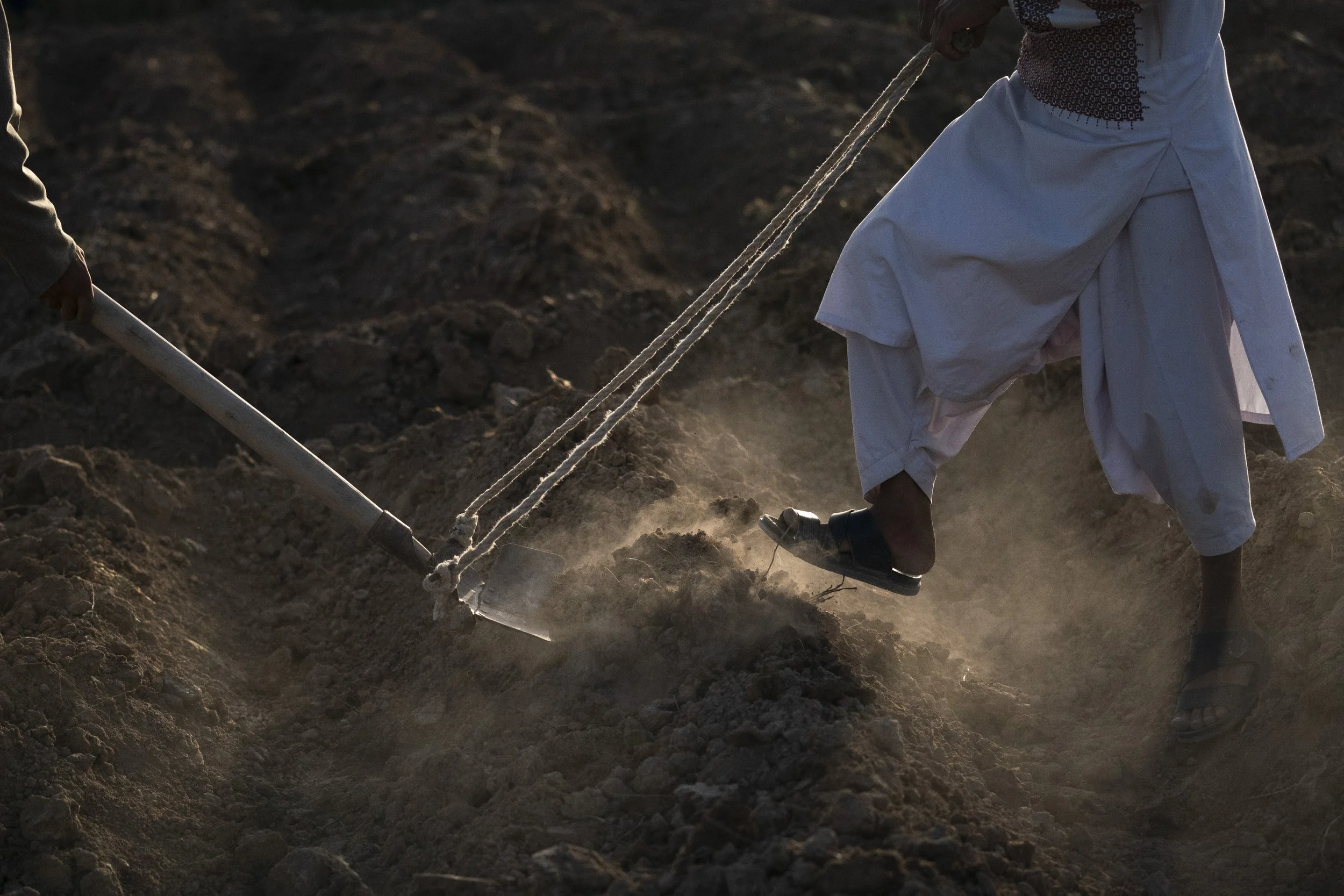
Opium: Climate Change Threatens Taliban's Ban
KANDAHAR, AFGHANISTAN-MAY 7:Farmers Sandar Mohammad, 22, left, and Saiful-u-Rahman, 18, work on an okra field in Kandahar province in Afghanistan on May 7, 2024. This area used to grow opium poppy plants, but have been converted to other crops.For decades, Afghanistan was the top exporter of opium in the world, accounting for more than 80 percent of the global supply prior to last year. Two-thirds of the country’s opium poppies were grown in southern Afghanistan, where temperatures in the last fifty years increased by up to 4.3 degrees Fahrenheit. The hardy plants thrived despite the harsh, salty desert landscape. Farmers relied on the crop to make their living through droughts and heat. Two years ago, after the Taliban took power in Afghanistan, they banned opium on religious grounds. Afghan farmers turning to alternative crops are finding that many no longer grow well because of the impact of climate change. This is forcing some farmers to abandon their fields, while others are weighing whether they should continue to comply with the ban on poppy cultivation. (Photo by Carolyn Van Houten/The Washington Post)
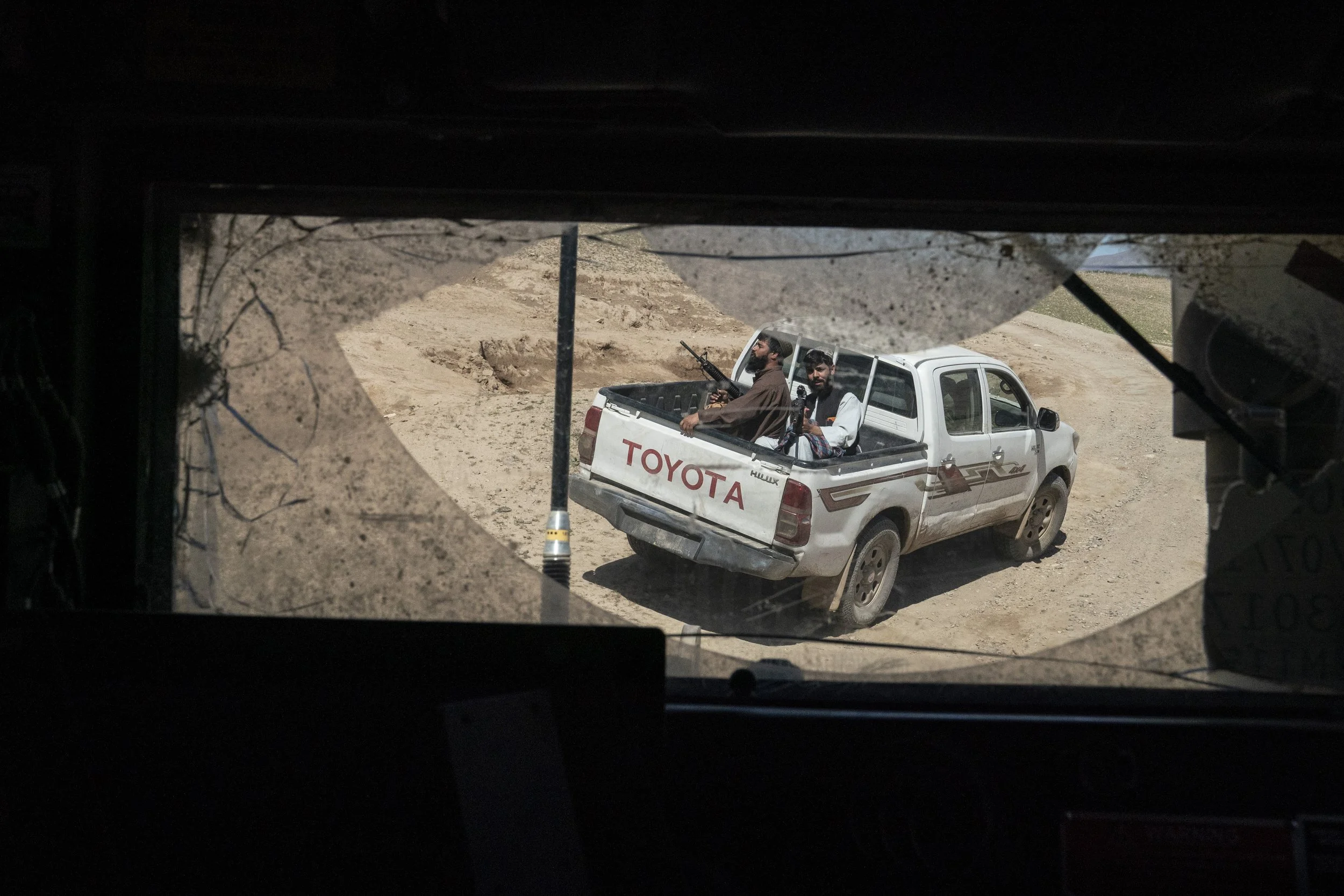
Opium: Climate Change Threatens Taliban's Ban
HERAT, AFGHANISTAN-MAY 11:A Taliban police officer drives an American humvee to a flood zone as other Taliban officers watch from the bed of a truck through his windshield in Chesht-e-Sharif, Herat, Afghanistan on May 11, 2024. Flash floods hit the area damaging homes and destroying crops. Many American military supplies were left behind and taken over by the Taliban after the United States pulled out of the country. Without proper emergency response equipment, this Taliban police unit has resorted to using the humvee left behind to help them in emergency situations, like the floods. (Photo by Carolyn Van Houten/The Washington Post)
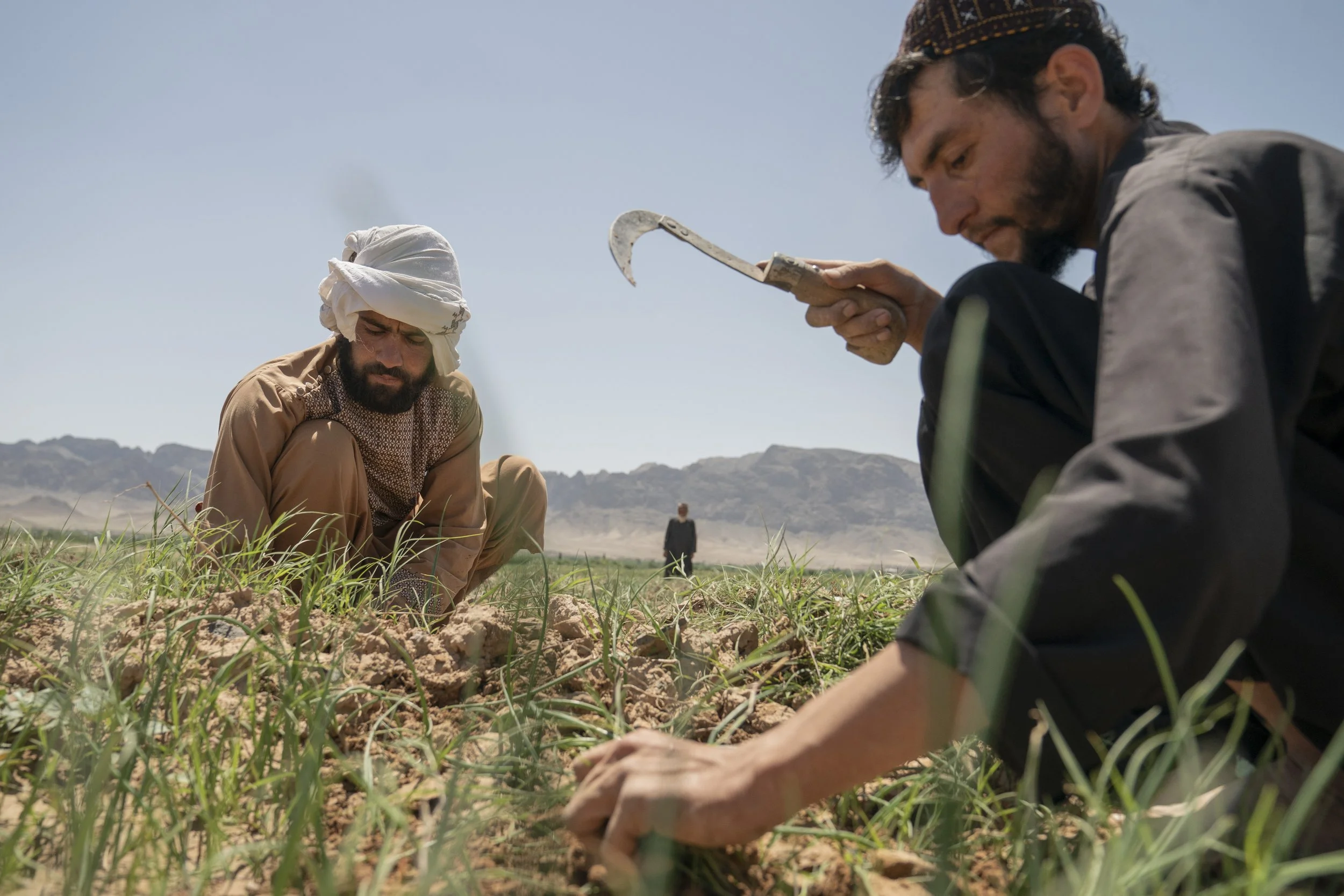
Opium: Climate Change Threatens Taliban's Ban
KANDAHAR, AFGHANISTAN-MAY 6:Hikmatullah, left, and Mohammad Quasm weed a field of green onions in Arghandab, Kandahar province in Afghanistan on May 6, 2024. These fields used to grow opium poppy plants, but have been converted to other crops, such as cumin, eggplant, and wheat. They both used to work in the poppy fields. Hikmatullah said, “I made more money from poppy. I could have afforded to marry two women if I was still working in poppy. I feel safer now, but I am making less money.” For decades, Afghanistan was the top exporter of opium in the world, accounting for more than 80 percent of the global supply prior to last year. Two-thirds of the country’s opium poppies were grown in southern Afghanistan, where temperatures in the last fifty years increased by up to 4.3 degrees Fahrenheit. The hardy plants thrived despite the harsh, salty desert landscape. Farmers relied on the crop to make their living through droughts and heat. Two years ago, after the Taliban took power in Afghanistan, they banned opium on religious grounds. Afghan farmers turning to alternative crops are finding that many no longer grow well because of the impact of climate change. This is forcing some farmers to abandon their fields, while others are weighing whether they should continue to comply with the ban on poppy cultivation. (Photo by Carolyn Van Houten/The Washington Post)
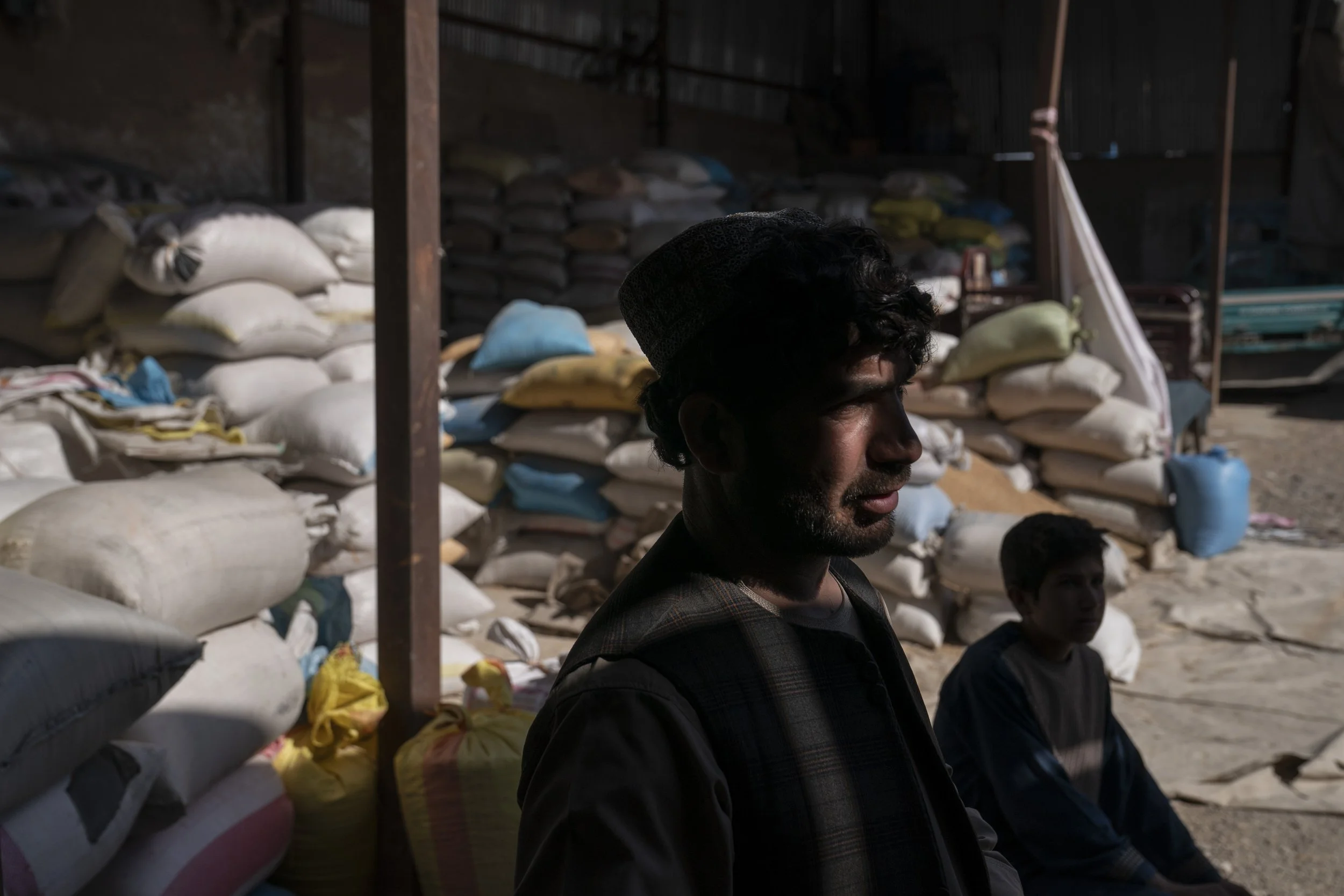
Opium: Climate Change Threatens Taliban's Ban
KANDAHAR, AFGHANISTAN-MAY 6:Bashir Ahmad, 31, talks about wheat prices at a wheat market where he works in Kandahar, Afghanistan on May 6, 2024. Wheat is one of the main crops farmers are trying to grow after losing their poppy fields. An increase in wheat production after the opium ban is driving prices down. For decades, Afghanistan was the top exporter of opium in the world, accounting for more than 80 percent of the global supply prior to last year. Two-thirds of the country’s opium poppies were grown in southern Afghanistan, where temperatures in the last fifty years increased by up to 4.3 degrees Fahrenheit. The hardy plants thrived despite the harsh, salty desert landscape. Farmers relied on the crop to make their living through droughts and heat. Two years ago, after the Taliban took power in Afghanistan, they banned opium on religious grounds. Afghan farmers turning to alternative crops are finding that many no longer grow well because of the impact of climate change. This is forcing some farmers to abandon their fields, while others are weighing whether they should continue to comply with the ban on poppy cultivation. (Photo by Carolyn Van Houten/The Washington Post)
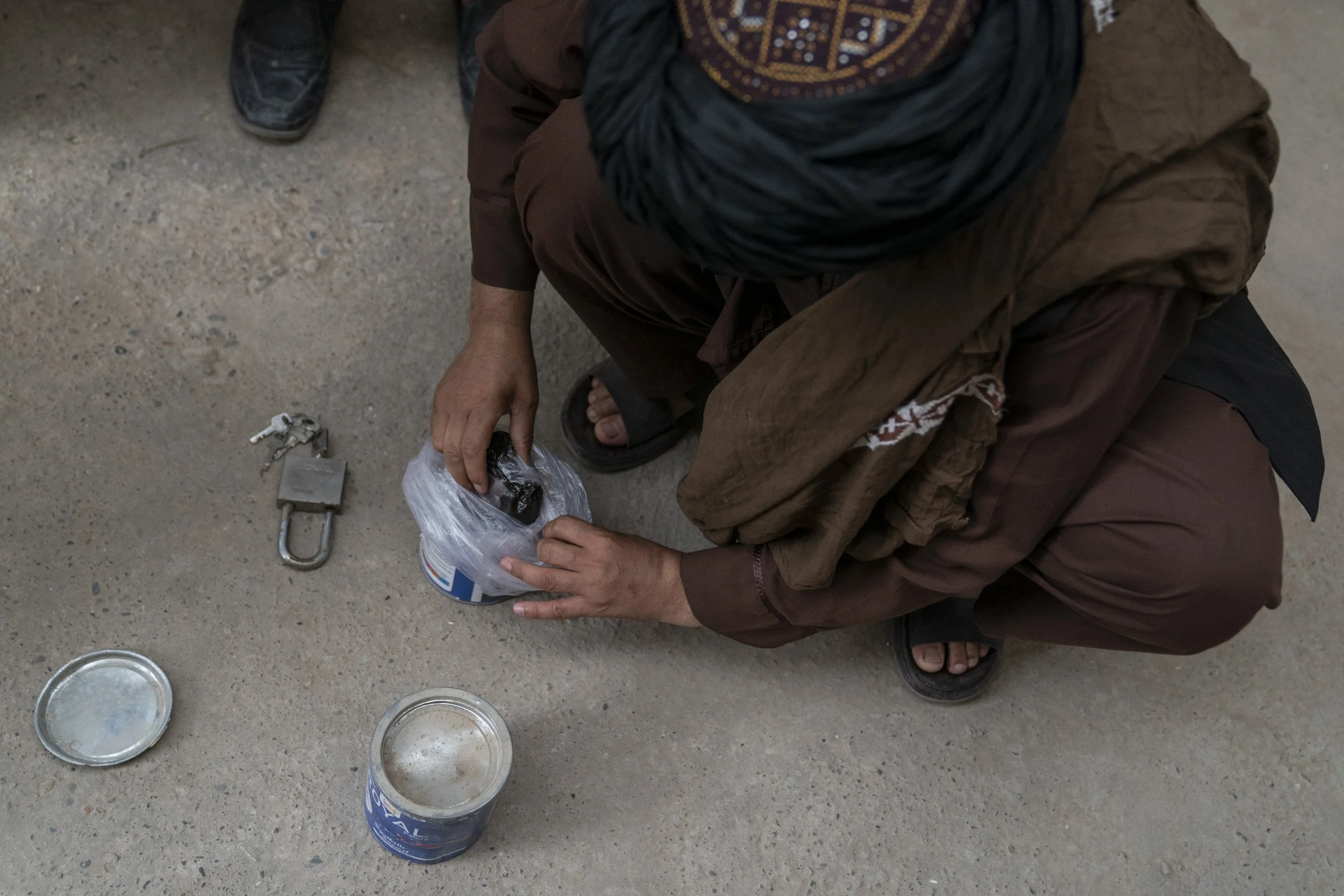
Opium: Climate Change Threatens Taliban's Ban
HERAT, AFGHANISTAN-MAY 9:A Taliban narcotics officer opens a can of confiscated opium in Herat, Afghanistan on May 9, 2024. For decades, Afghanistan was the top exporter of opium in the world, accounting for more than 80 percent of the global supply prior to last year. Two-thirds of the country’s opium poppies were grown in southern Afghanistan, where temperatures in the last fifty years increased by up to 4.3 degrees Fahrenheit. The hardy plants thrived despite the harsh, salty desert landscape. Farmers relied on the crop to make their living through droughts and heat. Two years ago, after the Taliban took power in Afghanistan, they banned opium on religious grounds. Afghan farmers turning to alternative crops are finding that many no longer grow well because of the impact of climate change. This is forcing some farmers to abandon their fields, while others are weighing whether they should continue to comply with the ban on poppy cultivation. (Photo by Carolyn Van Houten/The Washington Post)
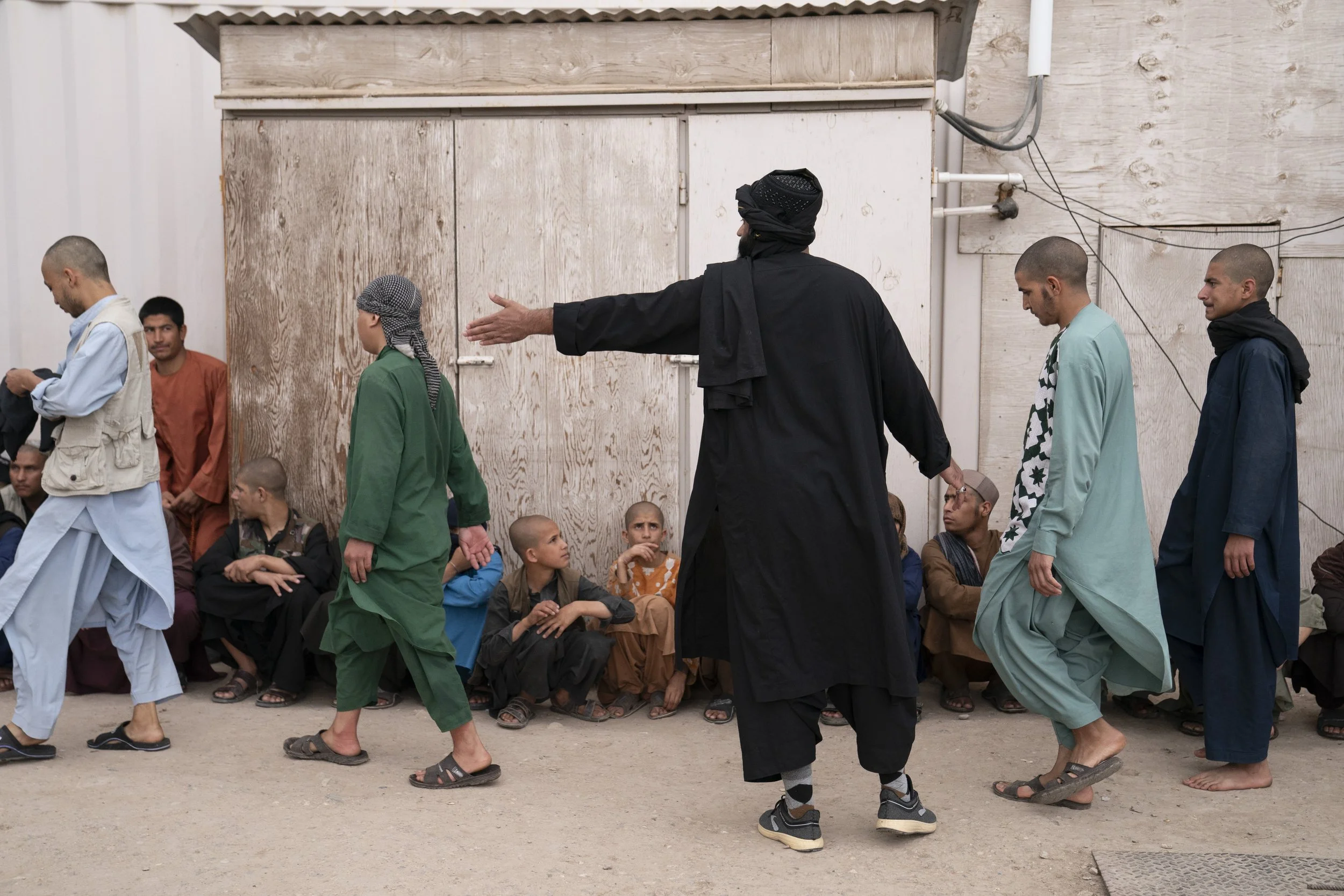
Opium: Climate Change Threatens Taliban's Ban
HERAT, AFGHANISTAN-MAY 9:Former addict Mohammad Arif, who is now an instructor teaching addicts how to become guards, directs young men at a Taliban drug rehab center in Herat, Afghanistan on May 9, 2024. When the Taliban took power three years ago, over ten percent of the population used drugs, according to Afghan officials. Thousands were then forced into rehab centers like this one.For decades, Afghanistan was the top exporter of opium in the world, accounting for more than 80 percent of the global supply prior to last year. Two-thirds of the country’s opium poppies were grown in southern Afghanistan, where temperatures in the last fifty years increased by up to 4.3 degrees Fahrenheit. The hardy plants thrived despite the harsh, salty desert landscape. Farmers relied on the crop to make their living through droughts and heat. Two years ago, after the Taliban took power in Afghanistan, they banned opium on religious grounds. Afghan farmers turning to alternative crops are finding that many no longer grow well because of the impact of climate change. This is forcing some farmers to abandon their fields, while others are weighing whether they should continue to comply with the ban on poppy cultivation. (Photo by Carolyn Van Houten/The Washington Post)
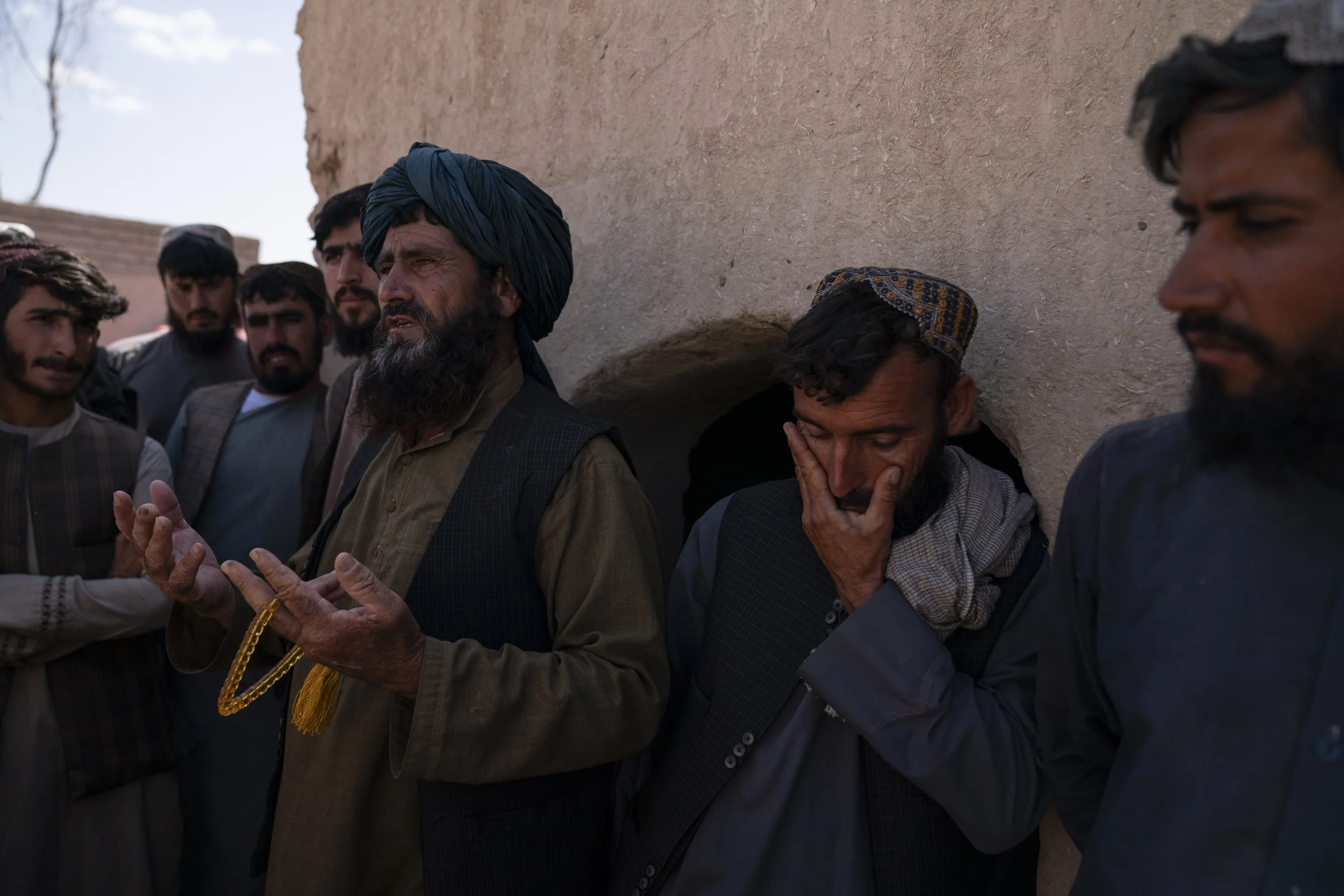
Opium: Climate Change Threatens Taliban's Ban
HELMAND, AFGHANISTAN-MAY 8:Haji Wazir, 55, a farmer, speaks at a cotton market in Helmand province about the challenges of losing his poppy fields in Afghanistan on May 8, 2024. This area used to grow opium poppies. Most fields have been converted to other crops, but they are not nearly as profitable and are vulnerable to climate change.For decades, Afghanistan was the top exporter of opium in the world, accounting for more than 80 percent of the global supply prior to last year. Two-thirds of the country’s opium poppies were grown in southern Afghanistan, where temperatures in the last fifty years increased by up to 4.3 degrees Fahrenheit. The hardy plants thrived despite the harsh, salty desert landscape. Farmers relied on the crop to make their living through droughts and heat. Two years ago, after the Taliban took power in Afghanistan, they banned opium on religious grounds. Afghan farmers turning to alternative crops are finding that many no longer grow well because of the impact of climate change. This is forcing some farmers to abandon their fields, while others are weighing whether they should continue to comply with the ban on poppy cultivation. (Photo by Carolyn Van Houten/The Washington Post)
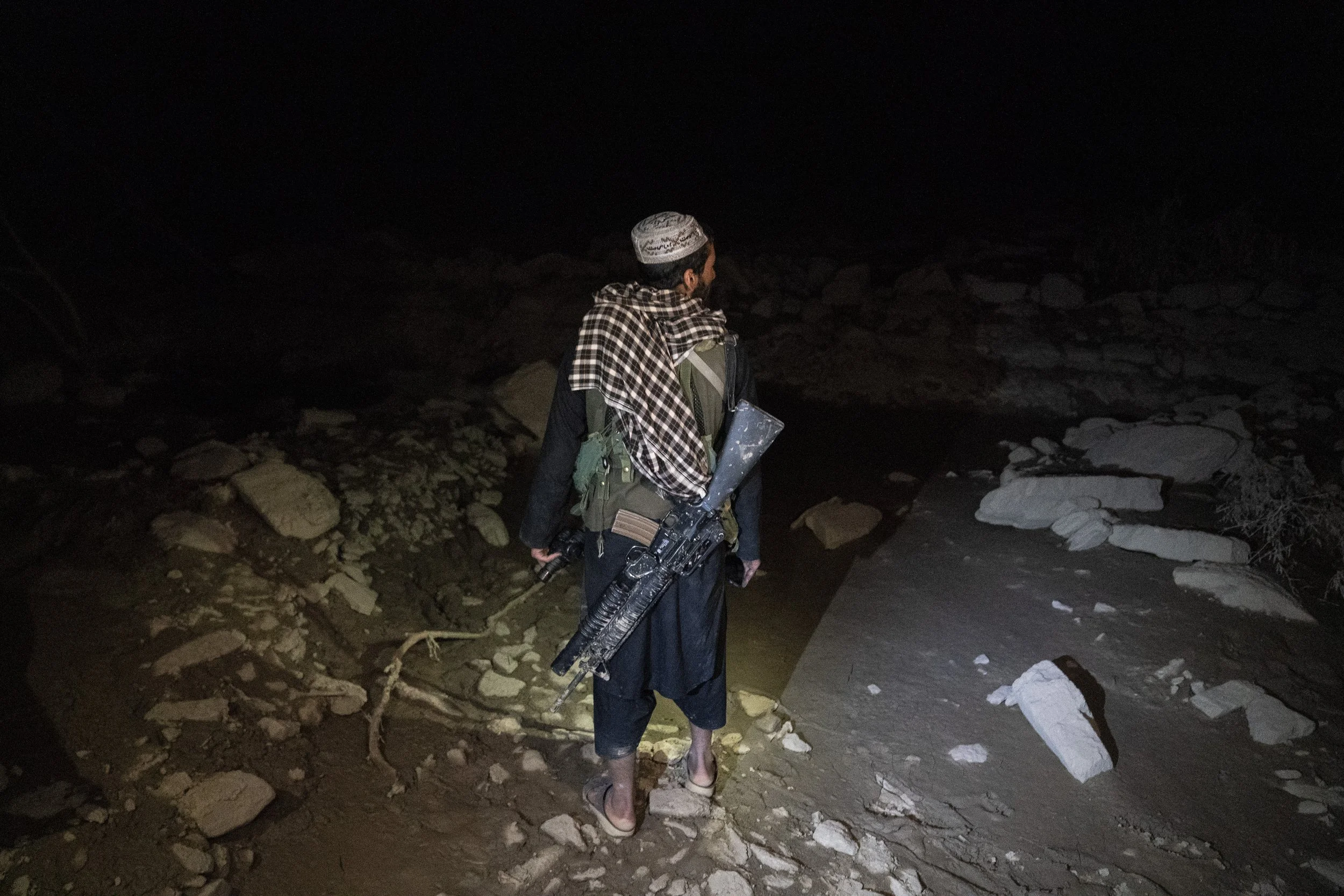
Opium: Climate Change Threatens Taliban's Ban
HERAT, AFGHANISTAN-MAY 10:A Taliban police officer holds American night vision goggles as he looks at damage in a flood zone in Chesht-e-Sharif, Herat, Afghanistan on May 10, 2024. Many American military supplies were left behind and taken over by the Taliban after the United States pulled out of the country. Flash floods hit the area destroying 80 homes and crops. (Photo by Carolyn Van Houten/The Washington Post)
Opium: Climate Change Threatens Taliban's Ban
PARWAN, AFGHANISTAN-MAY 18:A Taliban police officer leaps across a gate to gain entry to and destroy a poppy field in Parwan province, Afghanistan on May 18, 2024. For decades, Afghanistan was the top exporter of opium in the world, accounting for more than 80 percent of the global supply prior to last year. Two-thirds of the country’s opium poppies were grown in southern Afghanistan, where temperatures in the last fifty years increased by up to 4.3 degrees Fahrenheit. The hardy plants thrived despite the harsh, salty desert landscape. Farmers relied on the crop to make their living through droughts and heat. Two years ago, after the Taliban took power in Afghanistan, they banned opium on religious grounds. Afghan farmers turning to alternative crops are finding that many no longer grow well because of the impact of climate change. This is forcing some farmers to abandon their fields, while others are weighing whether they should continue to comply with the ban on poppy cultivation. (Photo by Carolyn Van Houten/The Washington Post)
Opium: Climate Change Threatens Taliban's Ban
PARWAN, AFGHANISTAN-MAY 18:A group of Taliban police officers destroy a poppy field in Parwan province, Afghanistan on May 18, 2024. Breaking the stalks with sticks releases a milky liquid from the plants and renders them useless in producing opium.For decades, Afghanistan was the top exporter of opium in the world, accounting for more than 80 percent of the global supply prior to last year. Two-thirds of the country’s opium poppies were grown in southern Afghanistan, where temperatures in the last fifty years increased by up to 4.3 degrees Fahrenheit. The hardy plants thrived despite the harsh, salty desert landscape. Farmers relied on the crop to make their living through droughts and heat. Two years ago, after the Taliban took power in Afghanistan, they banned opium on religious grounds. Afghan farmers turning to alternative crops are finding that many no longer grow well because of the impact of climate change. This is forcing some farmers to abandon their fields, while others are weighing whether they should continue to comply with the ban on poppy cultivation. (Photo by Carolyn Van Houten/The Washington Post)
Opium: Climate Change Threatens Taliban's Ban
KANDAHAR, AFGHANISTAN-MAY 7:Farmers Sandar Mohammad, 22, left, and Saiful-u-Rahman, 18, work on an okra field in Kandahar province in Afghanistan on May 7, 2024. This area used to grow opium poppy plants, but have been converted to other crops.For decades, Afghanistan was the top exporter of opium in the world, accounting for more than 80 percent of the global supply prior to last year. Two-thirds of the country’s opium poppies were grown in southern Afghanistan, where temperatures in the last fifty years increased by up to 4.3 degrees Fahrenheit. The hardy plants thrived despite the harsh, salty desert landscape. Farmers relied on the crop to make their living through droughts and heat. Two years ago, after the Taliban took power in Afghanistan, they banned opium on religious grounds. Afghan farmers turning to alternative crops are finding that many no longer grow well because of the impact of climate change. This is forcing some farmers to abandon their fields, while others are weighing whether they should continue to comply with the ban on poppy cultivation. (Photo by Carolyn Van Houten/The Washington Post)
Opium: Climate Change Threatens Taliban's Ban
HERAT, AFGHANISTAN-MAY 11:A Taliban police officer drives an American humvee to a flood zone as other Taliban officers watch from the bed of a truck through his windshield in Chesht-e-Sharif, Herat, Afghanistan on May 11, 2024. Flash floods hit the area damaging homes and destroying crops. Many American military supplies were left behind and taken over by the Taliban after the United States pulled out of the country. Without proper emergency response equipment, this Taliban police unit has resorted to using the humvee left behind to help them in emergency situations, like the floods. (Photo by Carolyn Van Houten/The Washington Post)
Opium: Climate Change Threatens Taliban's Ban
KANDAHAR, AFGHANISTAN-MAY 6:Hikmatullah, left, and Mohammad Quasm weed a field of green onions in Arghandab, Kandahar province in Afghanistan on May 6, 2024. These fields used to grow opium poppy plants, but have been converted to other crops, such as cumin, eggplant, and wheat. They both used to work in the poppy fields. Hikmatullah said, “I made more money from poppy. I could have afforded to marry two women if I was still working in poppy. I feel safer now, but I am making less money.” For decades, Afghanistan was the top exporter of opium in the world, accounting for more than 80 percent of the global supply prior to last year. Two-thirds of the country’s opium poppies were grown in southern Afghanistan, where temperatures in the last fifty years increased by up to 4.3 degrees Fahrenheit. The hardy plants thrived despite the harsh, salty desert landscape. Farmers relied on the crop to make their living through droughts and heat. Two years ago, after the Taliban took power in Afghanistan, they banned opium on religious grounds. Afghan farmers turning to alternative crops are finding that many no longer grow well because of the impact of climate change. This is forcing some farmers to abandon their fields, while others are weighing whether they should continue to comply with the ban on poppy cultivation. (Photo by Carolyn Van Houten/The Washington Post)
Opium: Climate Change Threatens Taliban's Ban
KANDAHAR, AFGHANISTAN-MAY 6:Bashir Ahmad, 31, talks about wheat prices at a wheat market where he works in Kandahar, Afghanistan on May 6, 2024. Wheat is one of the main crops farmers are trying to grow after losing their poppy fields. An increase in wheat production after the opium ban is driving prices down. For decades, Afghanistan was the top exporter of opium in the world, accounting for more than 80 percent of the global supply prior to last year. Two-thirds of the country’s opium poppies were grown in southern Afghanistan, where temperatures in the last fifty years increased by up to 4.3 degrees Fahrenheit. The hardy plants thrived despite the harsh, salty desert landscape. Farmers relied on the crop to make their living through droughts and heat. Two years ago, after the Taliban took power in Afghanistan, they banned opium on religious grounds. Afghan farmers turning to alternative crops are finding that many no longer grow well because of the impact of climate change. This is forcing some farmers to abandon their fields, while others are weighing whether they should continue to comply with the ban on poppy cultivation. (Photo by Carolyn Van Houten/The Washington Post)
Opium: Climate Change Threatens Taliban's Ban
HERAT, AFGHANISTAN-MAY 9:A Taliban narcotics officer opens a can of confiscated opium in Herat, Afghanistan on May 9, 2024. For decades, Afghanistan was the top exporter of opium in the world, accounting for more than 80 percent of the global supply prior to last year. Two-thirds of the country’s opium poppies were grown in southern Afghanistan, where temperatures in the last fifty years increased by up to 4.3 degrees Fahrenheit. The hardy plants thrived despite the harsh, salty desert landscape. Farmers relied on the crop to make their living through droughts and heat. Two years ago, after the Taliban took power in Afghanistan, they banned opium on religious grounds. Afghan farmers turning to alternative crops are finding that many no longer grow well because of the impact of climate change. This is forcing some farmers to abandon their fields, while others are weighing whether they should continue to comply with the ban on poppy cultivation. (Photo by Carolyn Van Houten/The Washington Post)
Opium: Climate Change Threatens Taliban's Ban
HERAT, AFGHANISTAN-MAY 9:Former addict Mohammad Arif, who is now an instructor teaching addicts how to become guards, directs young men at a Taliban drug rehab center in Herat, Afghanistan on May 9, 2024. When the Taliban took power three years ago, over ten percent of the population used drugs, according to Afghan officials. Thousands were then forced into rehab centers like this one.For decades, Afghanistan was the top exporter of opium in the world, accounting for more than 80 percent of the global supply prior to last year. Two-thirds of the country’s opium poppies were grown in southern Afghanistan, where temperatures in the last fifty years increased by up to 4.3 degrees Fahrenheit. The hardy plants thrived despite the harsh, salty desert landscape. Farmers relied on the crop to make their living through droughts and heat. Two years ago, after the Taliban took power in Afghanistan, they banned opium on religious grounds. Afghan farmers turning to alternative crops are finding that many no longer grow well because of the impact of climate change. This is forcing some farmers to abandon their fields, while others are weighing whether they should continue to comply with the ban on poppy cultivation. (Photo by Carolyn Van Houten/The Washington Post)
Opium: Climate Change Threatens Taliban's Ban
HELMAND, AFGHANISTAN-MAY 8:Haji Wazir, 55, a farmer, speaks at a cotton market in Helmand province about the challenges of losing his poppy fields in Afghanistan on May 8, 2024. This area used to grow opium poppies. Most fields have been converted to other crops, but they are not nearly as profitable and are vulnerable to climate change.For decades, Afghanistan was the top exporter of opium in the world, accounting for more than 80 percent of the global supply prior to last year. Two-thirds of the country’s opium poppies were grown in southern Afghanistan, where temperatures in the last fifty years increased by up to 4.3 degrees Fahrenheit. The hardy plants thrived despite the harsh, salty desert landscape. Farmers relied on the crop to make their living through droughts and heat. Two years ago, after the Taliban took power in Afghanistan, they banned opium on religious grounds. Afghan farmers turning to alternative crops are finding that many no longer grow well because of the impact of climate change. This is forcing some farmers to abandon their fields, while others are weighing whether they should continue to comply with the ban on poppy cultivation. (Photo by Carolyn Van Houten/The Washington Post)
Opium: Climate Change Threatens Taliban's Ban
HERAT, AFGHANISTAN-MAY 10:A Taliban police officer holds American night vision goggles as he looks at damage in a flood zone in Chesht-e-Sharif, Herat, Afghanistan on May 10, 2024. Many American military supplies were left behind and taken over by the Taliban after the United States pulled out of the country. Flash floods hit the area destroying 80 homes and crops. (Photo by Carolyn Van Houten/The Washington Post)










